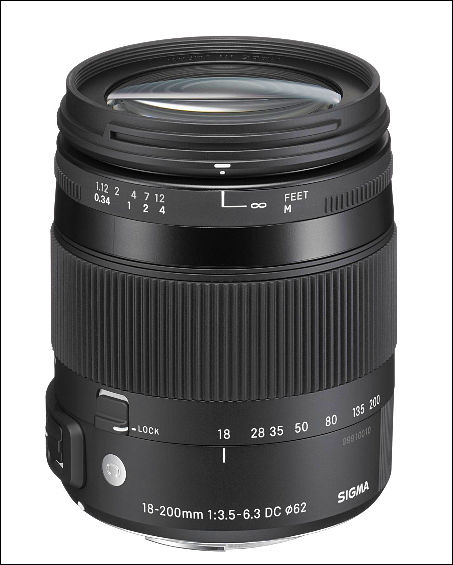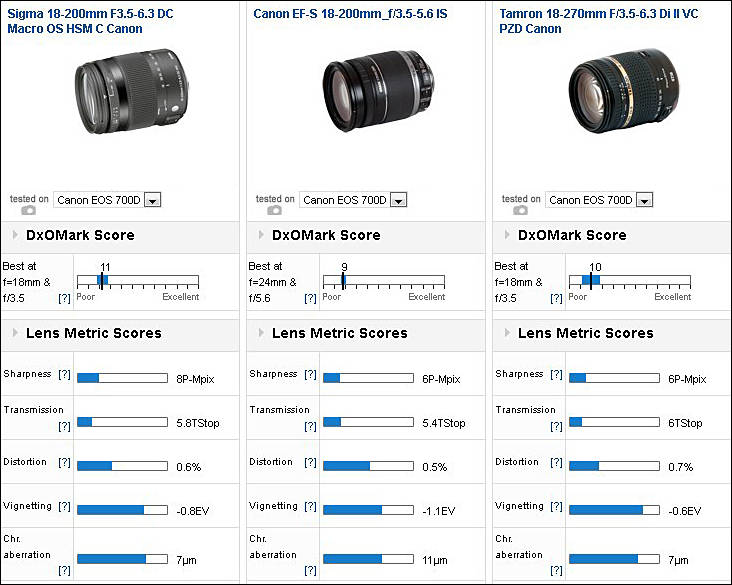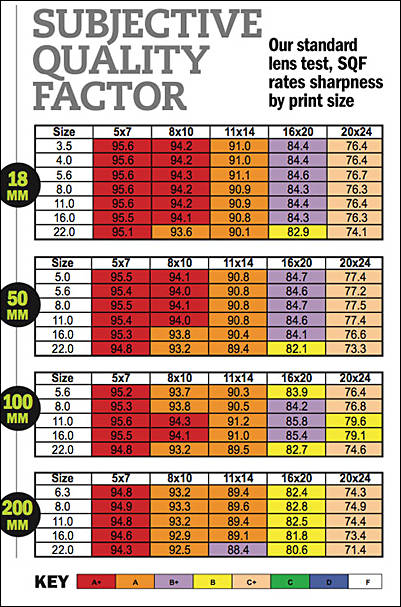
It allows to keep PV going, with more focus towards AI, but keeping be one of the few truly independent places.
-

Specifications:
- Designed for APS-C
- F22 Min aperture
- 7 blades
- 16 elements in 13 groups
- Min focus distance - 0.39 m
- Ultrasonic motor
- Filter - 62mm
- 430 g
Links
- http://www.imaging-resource.com/news/2014/01/07/sigma-announces-new-50mm-f-1.4-art-and-18-200mm-f-3.5-6.3-contemporary-lens
- http://www.sigmaphoto.com/product/18-200mm-f35-63-dc-macro-os-hsm-contemporary
PR
1. Contemporary line that covers a wide range of photography
SIGMA is organizing all its interchangeable lenses into three product lines; Contemporary, Art and Sports. Among the three, the Contemporary line is a high performance line which incorporates the very latest technology making it possible to accommodate both high optical performance and compactness for use in various photography situations. Sigma has solved the difficult problem of keeping the size and weight down without compromising optical performance and function with the latest technology. This lens covers frequently used wide-angle to tele-photo, as well as macro photography.
2. New standard zoom up to 200mm
SIGMA has always been producing a high performance standard zoom lens, dedicated for digital DSLR cameras, that covers up to 200mm by reflecting the latest technology.
In 2005, SIGMA released 18-200mm F3.5-6.3 DC as a smallest and lightest all-rounder lens in class that covers from wide-angle to tele-photo range. SIGMA, in 2007, incorporated OS (Optical Stabilization) functionality, and in 2011, has successfully made the size of the lens even more compact.
Now, this new lens has been redeveloped as the standard zoom lens from SIGMA’s new product line, which has higher performance, is even smaller and lighter-weight, and on top of that, includes “the macro feature”. As an entry level interchangeable lens, it is capable of many photographic scenes.
3. Diameter reduced by 4.6mm compared to its predecessor
We pursued the compactness as an ideal everyday lens. From an early stage of development, SIGMA was determined to make the lens size compact, for example, by incorporating double-sided aspherical lens elements and downsizing the motor. As a result, while the predecessor had a diameter of 75.3mm, this lens has reduced it to 70.7mm, which has the difference of 4.6mm. It also achieves -11% in volume ratio compared to its predecessor. It is one of the smallest in its class of lenses with more than a 7x zoom ratio, and is more comparable in size to a generic standard zoom lenses.
4. High rendering performance throughout the entire zoom range
With our Contemporary line, the lens is required to fulfill the maximum potential while achieving a compact and light-weight construction. This lens incorporates SLD (Special Low Dispersion) glass elements that have a high refractive index, and corrects chromatic aberration at the telephoto-end very well. Moreover, aspherical lens elements, including double-sided aspherical lenses, ensure a compact size and excellent correction of distortion. This also helps to produce superior rendering performance throughout the entire zoom range from wide-angle to tele-photo and macro photography.
5. Close-up photography
One of the biggest features of this lens is that it is possible to shoot subjects as close as Macro lenses. This lens features a minimum focusing distance of 39cm and a maximum magnification ratio of 1:3. It offers the versatility for shooting close-ups of fashion accessories, cuisine, flower arrangements and much more without changing the lens. Its working distance is 14.7cm, and it is suitable for shooing images with natural light as it keeps the shadows of camera and lens off of the image. On its lens barrel, it indicates the maximum shooting magnification at each focal length, and it is so convenient for a photographer that the size of the object in the image sensor becomes easily recognizable. Uncompromising in every aspect of lens design, Sigma has even chosen to engrave the product name on the front of the lens to prevent reflections of the letters during close-up photography.
6. Incorporating new composite TSC
In product development of cameras and lenses, it is crucial to lay out main components, metal parts and polycarbonate, to optimize and ensure each feature. This lens has incorporated TSC (Thermally Stable Composite) that has the same level of thermal shrinkage as aluminum and little elasticity, especially in temperature changes. Since thermal shrinkage is low, it has a high affinity to metal parts that contributes to high precision in product manufacturing. It also results in slimmer mechanical parts, such as the zoom ring and scaling.

 a7_35.jpg453 x 565 - 42K
a7_35.jpg453 x 565 - 42K -

Sigma’s cosmetic revamp of the exterior and revision of the optical construction has resulted in a lens that not only looks classy but also produces results superior to rivals including those from Canon.

 laing6.jpg732 x 585 - 80K
laing6.jpg732 x 585 - 80K -

Image quality is pleasingly amazing overall with the Sigma 18-200mm f3.5-6.3. It’s sharp across its entire zoom range and produces wonderful true to life colors straight out of the camera.
http://www.thephoblographer.com/2014/04/15/review-sigma-18-200mm-f3-5-6-3-dc-macro-os-hsm-canon-ef/

 cage15.jpg800 x 485 - 75K
cage15.jpg800 x 485 - 75K -

 sample18.jpg800 x 531 - 84K
sample18.jpg800 x 531 - 84K -

 fish26.jpg401 x 607 - 92K
fish26.jpg401 x 607 - 92K -

Lens is great all rounder that can be recommended, especially to beginners who are just getting to grips with the idea of having interchangeable lens cameras. Those who have a few different lenses may also want to consider it for convenience too, but keeping a few primes for those times that you need a wide aperture.
http://www.photographyblog.com/reviews/sigma_18_200mm_f3_5_6_3_dc_macro_os_hsm_review/

 sample103.jpg800 x 534 - 56K
sample103.jpg800 x 534 - 56K
Howdy, Stranger!
It looks like you're new here. If you want to get involved, click one of these buttons!
Categories
- Topics List23,979
- Blog5,725
- General and News1,352
- Hacks and Patches1,153
- ↳ Top Settings33
- ↳ Beginners255
- ↳ Archives402
- ↳ Hacks News and Development56
- Cameras2,362
- ↳ Panasonic991
- ↳ Canon118
- ↳ Sony156
- ↳ Nikon96
- ↳ Pentax and Samsung70
- ↳ Olympus and Fujifilm100
- ↳ Compacts and Camcorders300
- ↳ Smartphones for video97
- ↳ Pro Video Cameras191
- ↳ BlackMagic and other raw cameras116
- Skill1,961
- ↳ Business and distribution66
- ↳ Preparation, scripts and legal38
- ↳ Art149
- ↳ Import, Convert, Exporting291
- ↳ Editors191
- ↳ Effects and stunts115
- ↳ Color grading197
- ↳ Sound and Music280
- ↳ Lighting96
- ↳ Software and storage tips267
- Gear5,414
- ↳ Filters, Adapters, Matte boxes344
- ↳ Lenses1,579
- ↳ Follow focus and gears93
- ↳ Sound498
- ↳ Lighting gear314
- ↳ Camera movement230
- ↳ Gimbals and copters302
- ↳ Rigs and related stuff272
- ↳ Power solutions83
- ↳ Monitors and viewfinders339
- ↳ Tripods and fluid heads139
- ↳ Storage286
- ↳ Computers and studio gear560
- ↳ VR and 3D248
- Showcase1,859
- Marketplace2,834
- Offtopic1,319










